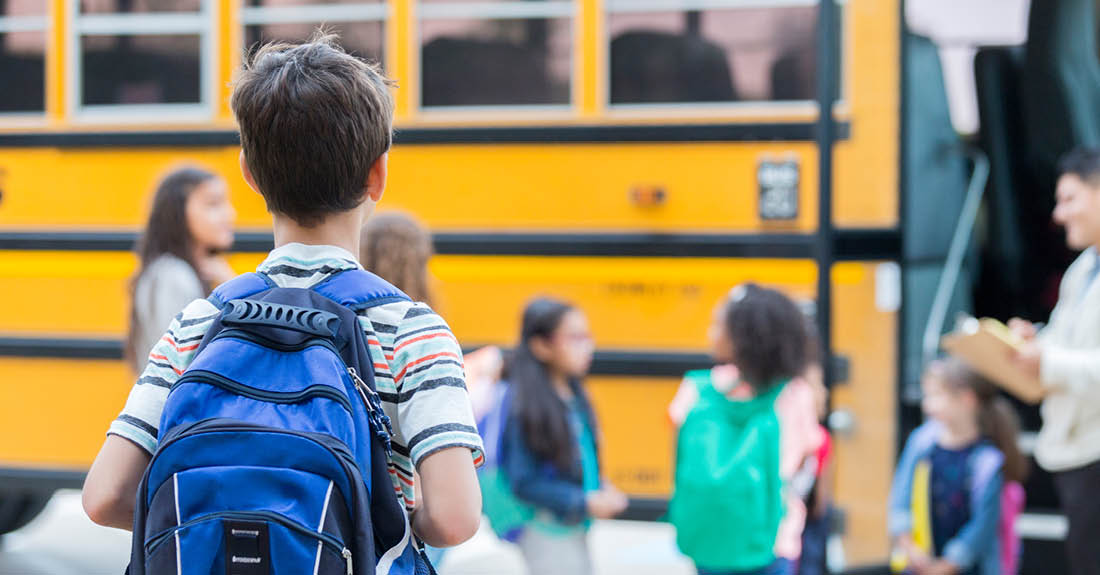Back-to-school season can bring up no shortage of emotions in both parents and students. For some, this is an exciting time. Kids look forward to seeing their friends, meeting their teachers, shopping for school supplies and participating in extracurricular activities.
However, heading back to the classroom can bring on anxiety for a vast number of students. Regardless of age, many kids feel overwhelmed, nervous or anxious about school. It is important to recognize these signs in your child so you can help them take control of their brain health and set them up for success this school year.

Recognizing anxiety in your child
Anxiety can’t be put in a box. There are various types that your child could be experiencing including generalized anxiety, separation anxiety and social anxiety.
Generalized anxiety is exactly what it sounds like – general worry or anxiety without specific cause. It is the most common of the three anxiety disorders.
Separation anxiety presents as excessive feelings of distress when or leading up to being away from home or loved ones. Young children are prone to this when experiencing times of stress, such as the start of a new school year. Symptoms include clinginess, reluctance to leave a loved one or unexplained crying.
More common in older kids, social anxiety is a brain health condition that causes worry or self-consciousness due to the fear of being judged or embarrassed. Students with social anxiety can face challenges in a classroom setting when being called upon for an answer, reading to the class or working in groups. Common symptoms to look for include social isolation and increased stress levels in social situations.
Tips to alleviate school anxiety
No matter the type of anxiety your child has, the following tips can help ease their back-to-school worries.
Elementary Children
Brain health disorders begin to develop in early childhood. Know the signs and how to help your child from an early age.
- Have a back-to-school routine. This can include earlier bedtime, less screen time or laying out clothes for the next day.
- Visit the school ahead of time. This can be especially helpful if your child is going to a new school or going to school for the first time. Allow them to become familiar with the classroom, lunchroom and playground. If possible, attend back-to-school night so your child can meet their teachers.
- Provide positive reinforcement. Reward your child with a special treat in their lunchbox or a fun activity after school. This will allow them to focus less on their anxious feelings and more on getting through the school day to reach their reward.
Middle Schoolers
When your child enters middle school, they are overwhelmed with big transitions. Newfound independence, desire to fit in and body changes can all contribute to increased anxiety levels.
- Help them get involved. While some extra-curricular activities can be anxiety inducing, they are a great way for kids to make friends and find activities they enjoy.
- Empower your child’s emotions. Helping your child understand their feelings is powerful. When they understand why they are feeling anxious, the racing heartbeat and sweaty palms become less scary.
- Show them how to establish coping mechanisms. Teach your child how to calm their worries by practicing mindfulness or using other distractions.
High Schoolers
High school is a big transition that brings new stressors including peer pressure, heavy homework loads and planning for college. Nearly 11% of children aged 12 to 17 are diagnosed with anxiety.
- Provide healthy ways to process their feelings. Whether this is journaling, seeing a therapist or talking to a mentor, everyone needs an emotional outlet that feels safe.
- Allow space for them to share. Instead of asking your teenager “How did you do at school today?” or “What is making you anxious?” allow them room to share on their own accord.
- Be a role model. Take care of your own brain health. If you are anxious or worried about something, that can rub off on your child.
If you find that your child’s back-to-school anxiety persists for several weeks and affects their overall physical, emotional or brain health, reach out at HICSIowa.org.
